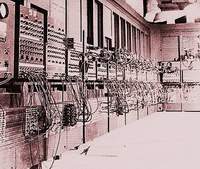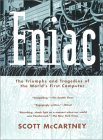ENIAC (1 april 2006)
Who invented the computer? I bet you don't know.
You may know the inventor of the light bulb -- of course: Edison. And you may have heard who invented the steam engine: James Watt!
But ask anybody to tell you who invented the computer. And most probably you won't get an answer.
In 1999, Wall Street Journal writer Scott McCartney wrote a book about the development of ENIAC, which is generally considered to be the first real electronic computer ever made.
In the late thirties, a young physicist named John Mauchly was keenly interested in weather predictions. He realized that predicting the weather required much faster calculators than could be provided by the technology available at the time.
Together with electronics engineer Pres Eckert, he started building a machine that combined several calculators. But this machine did not use cams, wheels or any other mechanical means, but electronic valves - which were hundreds of times faster than mechanical parts.
Mauchly and Eckert realized the project would be a costly affair since even the simplest design required thousands of valves. Luckily, the USA army needed such a machine at the time. So soon the project was funded with $61,700 provided by the US army. The project was named Electronic Numeric Integrator And Computer , or in good army tradition the acronym ENIAC.
 ENIAC
ENIAC
The computer was completed in the autumn of 1945, too late to have any impact on the outcome of the war. But the army would use it for calculations in Project Manhattan, the development of the hydrogen bomb.
The first hundred or so pages of the book are devoted to the development of the computer and the many problems Mauchly and Eckert found on their way. Then the story takes a nasty turn: as soon as the machine nears its completion, all kinds of people attempt to take the credit of the invention.
First, there is the project administrator Dr Brainerd, who had hardly been interested when the computer was being built. When the project turned out to be successful, he made great efforts to create the impression that he had played a principal role in it.
Then there was mathematician John von Neumann. When the ENIAC was already in an advanced stage of its development, he became interested in the project. By the time the computer was as good as finished, a report appeared that suggested he was the actual inventor.
Initially, Mauchly and Eckert did not apply for a patent. But when they finally did, manufacturer Honeywell came up with the name of Atanasoff, who had tried to make an electronic computer in 1941. In spite of the fact that Atanasoff's computer had never really worked properly, Honeywell's lawyers managed to convince the judge that the computer was invented by John Atanasoff.
From that moment it looks as if Atanasoff started to believe this story. In 1988 he cooperated with journalist Clark Mollenhoff on the book John Atanasoff, Forgotten Father of the Computer , in which Mauchly is actually accused of having stolen Atanasoff's idea. This notion is the more preposterous since John Atanasoff was actually given the chance to build a computer, heavily funded by the USA navy, but his efforts never came to anything.

The book Eniac does not only give a very good account of what can probably be called the most important invention in the history of engineering. But the story about intrigues and human pettiness is better than many a work of fiction has to offer.
As far as I'm concerned, I immensely enjoyed reading it. It's a book I highly recommend.